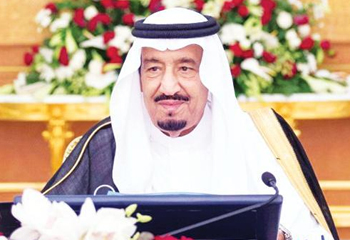Jeddah, Sep 16: The Council of Ministers has prioritized housing, jobs and an increased standard of living for citizens in its 10th Five-Year Development Plan from 2015 to 2020.

The plan aims to strengthen the Kingdom’s economy and promote its growth, stability and competitiveness. “It also aims to enhance institutional reforms, support civil institutions and raise the efficiency and productivity of state agencies and their employees,” Khoja said.
The new five-year plan will uphold the principles of accountability and transparency and strive for the protection of integrity and fight corruption, the minister added.
The Cabinet, which was chaired by Crown Prince Salman, deputy premier and minister of defense, also adopted several measures to crack down on errant Umrah operators.
The Cabinet approved amendments to laws regulating Umrah trips from outside the Kingdom. The Interior Ministry would use Article 60 of the country's residency law to punish Umrah companies involved in trading visas, and bringing people to the country for other purposes.
“The Ministries of Interior and Haj shall prevent Umrah companies from accessing their automated system if they fail to ensure the return of their pilgrims from the Kingdom to their respective countries,” Khoja said while explaining the new regulations.
The Cabinet authorized the minister of housing to discuss with his Egyptian counterpart a housing cooperation agreement. It banned non-Saudis from time-sharing activities or marketing the scheme in Makkah and Madinah. “Non-Saudis are also banned from the acquisition of any rights under time-sharing for tourist real estate units in Makkah and Madinah except through inheritance,” Khoja said.
The Cabinet congratulated Custodian of the Two Holy Mosques King Abdullah for being awarded an honorary doctorate degree from Imam Muhammad bin Saud Islamic University. The Cabinet was briefed on the telephone conversation between King Abdullah and US President Barack Obama.
Referring to last week›s Jeddah meeting to fight Islamic State militants, the Cabinet reiterated the Kingdom’s commitment to stand against the threats posed by terrorism in all its forms.
Khoja said the Cabinet welcomed the formation of the new Iraqi government and the confidence in it by the Iraqi parliament. It hoped that this would contribute to the return of security and stability in Iraq and the consolidation of national unity and cohesion among its people.
On the occasion of the 27th session of the Human Rights Council in Geneva, Saudi Arabia renewed its call on the international community to protect the rights of the Palestinian people for self-determination and an independent state with Jerusalem as its capital.
The Kingdom expressed deep regret at the world not taking a decisive and courageous stand to end the suffering of the Syrian people. The Kingdom also renounced terrorism and extremism and rejected and condemned the gross violations of human rights perpetrated by terrorist organizations.
In this context, the Cabinet thanked the Office of the United Nations High Commissioner for Refugees for praising the Kingdom’s humanitarian assistance to refugees in various countries.
The Cabinet praised security and customs officers for their efforts in preventing attempts to smuggle drugs worth SR2 billion into the Kingdom and arresting 1,197 smugglers and drug traffickers over the past six months.
The Cabinet welcomed the Human Development Report 2014 issued by the United Nations Development Program, which raised the Kingdom’s rank from 57 to 34 in human development programs.
The Cabinet postponed the transfer of jurisdiction of the investigation and prosecution on customs issues from the Customs Department to the Bureau of Investigation and Prosecution for a period of four years, Khoja said.
The Cabinet appointed Tariq bin Ziyad Al-Sudairi a member of the board of directors of the Saudi Stock Exchange (Tadawul) representing the licensed brokerage companies; Sami bin Abdullah Al-Saleh as ambassador at the Foreign Ministry; Prince Saud bin Fahd bin Abdullah, deputy governor for security affairs in Riyadh; Saad bin Abdullah Al-Mufreh financial advisor at the Ministry of Health; Abdullah bin Sulaiman Al-Maiman director general of financial affairs at the Ministry of Defense; Hashim bin Abdullah Shatta minister plenipotentiary at the Ministry of Foreign Affairs; Abdulaziz bin Saleh Al-Muhanna administrative advisor at the Ministry of National Guard; Ibrahim bin Abdulkarim Al-Khatib adviser at Riyadh governorate; and Yusuf bin Abdullah Al-Saadi sector head at the Finance Ministry.






Comments
Add new comment